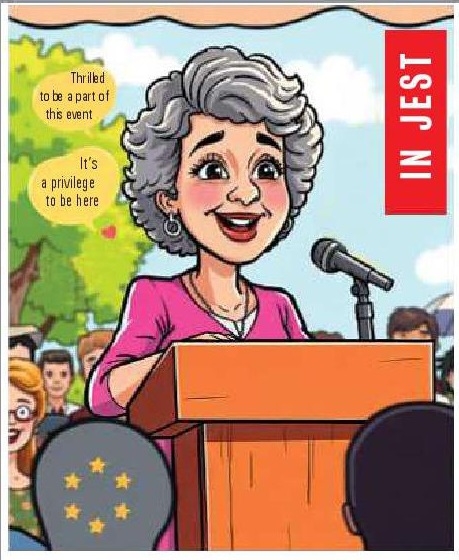The Cliché Chronicles
29 Sep 2024 12:31:12

By Aasawari Shenolikar :

“AND amidst us we have, as Chief Guest
of today’s function, Aasawari Shenolikar,
who has very kindly agreed to grace the
occasion,” the anchorstated. I,sittingon thedais,
smilingly acknowledged theMasterofCeremony,
and gracefully accepted the sapling that was presented to me. But the thought running through
my mind was, “Ah! Here we go again.” I knew
exactly what was coming next - because after
attending innumerable functions - some as a
Guest, a few as one among the many spectators
- I sort of knew the MC’s address by heart.Barring
a few expressions, everything generally follows
the same discourse.“Took time off from her busy
schedule.” They don’t know for sure whether I
am really super busy in the office, or am binge
watching Net flix at home,orup dating my LinkedIn
everyday as it becomes mandatory to show to
the world all the functions you have so humbly
presided over.
But the minute someone approaches with an
invite, the response is always, “Let me check my
calendar.” Now, that’s the most clichéd statement - the calendar, in my case, for most part is
empty. But I cannot show over enthusiasm at
being invited.
Of course, after a couple of days,
it’s always a “I had to juggle things a bit, adjust
my schedule,” to which the host exults, “It will
be such a privilege to have you preside over the
function.” How noble, I think. Noble!??
Later, I, in my speech, always make it a point
to gush, “It’s such a privilege to be here with you
all today. It’s an honour to be in the presence of
such esteemed company.” Now esteemed
company could range from a local individual
who has just stepped into the realm of political
arena and is attempting very hard to make a
mark for himself, or students, who do not want
to hear long lectures, which they perceive as
yawn-inducing.
At school events,Ioften envisage myself as a
spectator, willing for the speech of the
chief guest to end, so I could be free to
do anything else thanlistening tothediatribe from thedais.That is why I feel happy when the organisers insist on ‘two
words.’ Ideally those two words should
simply be ‘Thank You.’
But that would
be considered rude.
SoIweave my speech around theevent,
ensuring that I mention how this event
is“a testament to thehardwork andd edication of the organisers.” It’saline delivered with a mechanical precision, honed
to perfection only becauseit’sbeen used
sooften.And since the time I’veread that
Ted Ex speakers are bound by a time limit of 18minutes,for according to the TED
Curator Chris Anderson, “18 minutes is
long enough to be serious and short
enough tohold the attention of the audience,” I ensure thatI do not hold themic
for a minute longer than that. Many a
time, it is expected from me to motivate
the audience, you can imagine the positivecliches that formapartofmyaddress.
I suddenly find myself as the Prophet of
Positivity, the Guru Mai of good vibes,
and the champion of clichés. I have lost
count of the times I’ve used, “It’s not about how
many times you fall; it’s about how many times
you rise and try again.”
In retrospect, I often think, “Why indulge in
doing things that make you fall?”
The speaker me says, “Believe in yourself, and
anything is possible,” forcing me to later contemplate, “Anything?!! Even winning the lottery
without buying a ticket? Now wouldn’t that be
awesome.”These lines have been delivered with
suchzeal,( I am clueless whether they have been
heard withrapt attention-for oftenI see students
squirming, yawning, and doing everything that
makes the guest at the podium so uncomfortable as to quickly end the speech) that I’ve started blindly believing them.
During my latest function, I realised that I’ve probably delivered the
same speech a thousand times at least, with a
little modification here and there, and
definitely a different backdrop.
Ah! the world of clichés-a place where originality goes for a toss, and most of us are left to
negotiate througha swamp ofpredictablephrases and repetitive responses. If life hadascript, it
would be riddled with these well-worn lines that
have been churned out at every event, ceremony, including beauty pageants since time
immemorial.
Talking of beauty pageants, that one event has
the most overused, eye-roll-inducing phrases
that, for some unfathomable reason, have been
apartof everybeautypageant, and forsomeinexplicable reason refuse to die. These pageants are
the final frontier of clichés - every year, without
fail when the winner is declared, the reaction is
a well-rehearsed spectacle that has been passed
down from one Beauty Queen to the next like a
sacred tradition.
All of you know what I am talking about - the
shortlisted contestants hold hands,waiting expectantly, then comes the shock, followed by awe
when the winneris announced.The hint of tears,
the covering of the mouth with her hands, eyes
wide in disbelief, as though she just found out
she won the lottery instead of the title she’d been
aiming for since she could walk in heels. And
then comes the inevitable tearful gratitude, that
is littered with, “Ijust want to say,Inever expected this,” she says, flashing her perfectly whitened
teeth. “This is a dream come true.” The ‘dream
come true’ is delivered with such sincerity, you
almost forget that the real dream was about the
many endorsementdeals that follow thewin.And
finally, the piece de resistance, “I want to use this
platform to make the world a better place.”
Admirable, yes. Original? Absolutely not.
This is also true of the awardees who receive
their coveted prizes at various functions.
Now
we all know that anyone whois shortlistedin any
category has a hope that he/she will win. And
even if they do pretend that they didn’t see it
coming, we all know that they’ve spent at least
a month practicing their acceptance speech in
front of a mirror. Clutching the coveted trophy,
the lines they deliver with faux humility, invariably will be peppered with, “There are so many
other deserving candidates,” to “thanking the
members who made this possible, and lastly the
family without ‘whose unstinted support, it
wouldn’t have been possible.’” Ho, hum!
Thunderous applause belies the fact that the
same speech is delivered by different awardees
every year, except the faces and the setting, nothing is new.
I am not like Kareena Kapoor of Jab We Met -
reference to ‘Main apni favourite hoon.’ My fav
clichés are not the ones that I listed when I am
holding the microphone.
This award goes to a
line that is a trademark of every public servant
wielding some authority. “I have a vision.”
These representatives are undoubtedly the
grandmasters of cliches, particularly when it
comes to speeches that are heavy on promises
and light on details. Be it a localrally or a national televised debate,one common cliche that each
such public servant utters at least once is “I have
a vision.”
Unfortunately the vision endswith the full stop
at the end of that cliché. For the grandiose statements that follow the ‘vision’ proclamation are
usually very vague and mean absolutely nothing.“Ihavea vision for a prosperous nation where
every citizenhas the opportunity to thrive.”Chest thumping stuff, except they conveniently leave
out how they plan to turn this vision into reality. Then there’s the classic, “Let’s join hands and
work together for the common good.”
Which
translates to ‘I’ll make lofty promises while you
do all the actual work.’ Of course, no political
speech would be complete without the phrase,
“Let me be clear.” This is the cue to start tuning
out because whatever follows is about to be as
clear as a muddy puddle, or the ‘vision’ that he
started his speech with.
Whatever be the case, the one thing that we
cannot take away from these clichés is that they
have been tried and testedover generations, and
yes,they lack originality.Yet, they have managed
to remain in circulation - year after year, speech
after speech.
So here’sto the clichés-may they never change,
and may we never stop rolling our eyes at them.
And who knows? Maybe one day, we’ll find an
alternative to “It’s always a privilege” or “I took
time off from my busy schedule.”
Until then, we’ll just keep playing the same old
tune, and laughing or sniggering, as the casemay
be, all the way through it.
Ah! The phone is ringing. “Hello,” I respond,
“Sure, let me just check my calendar. I will get
back to you!”